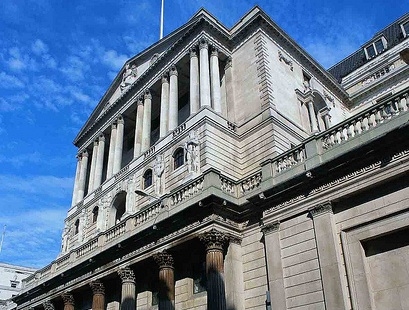The Bank of England has held its base rate at 0.25%, it announced today, although the next move could be up to help keep inflation under control.
Government bond purchases were set at £435bn and corporate bond purchases at £10bn, the same as the previous month.
The Bank of England Monetary Policy Committee voted 7-2 to maintain the rate at 0.25. Two members voted for a rise to 0.5% however MPC members have indicated that if the base rate needs to rise in future to keep inflation under control any rise would need to be gradual and limited. The rate was last cut in August 2016 from 0.5% to 0.25%, which was the first change made in seven years.
The Bank of England reiterated its 2% inflation target. The current CPI inflation rate rose this month from 2.6% to 2.9% and some commentators have predicted it could rise above 3%. RPI inflation, an older measure, is already 3.9%.
In its most recent look at the outlook for inflation and activity in the August Inflation Report, the MPC assessment depended on three main judgments: that the lower level of sterling continues to boost consumer prices broadly as projected, and without adverse consequences for inflation expectations further ahead; that regular pay growth remains modest in the near term but picks up over the forecast period; and that subdued household spending growth is largely balanced by a pickup in other demand.
Since the August Report, the Bank says that "relatively limited news on activity" points to a slightly stronger economy than anticipated. GDP rose by 0.3% in the second quarter, as expected in the MPC’s August projections, although initial estimates of private final demand were softer than anticipated.
Unemployment has continued to decline, to 4.3%, its lowest in over 40 years and a little lower than forecast in August. Survey indicators are consistent with continued strength in employment growth. Underlying pay growth has shown some signs of recovery, albeit remaining modest, says the Bank.
In terms of Brexit, the MPC says that policy cannot prevent either the "necessary real adjustment as the United Kingdom moves towards its new international trading arrangements" or the "weaker real income growth that is likely to accompany that adjustment over the next few years."
The MPC’s remit specifies that, in exceptional circumstances, the Committee must balance any trade-off between the speed at which it intends to return inflation sustainably to the target and the support that monetary policy provides to jobs and activity. Recent developments suggest that remaining spare capacity in the economy is being absorbed a little more rapidly than expected at the time of the August Report, and that inflation remains likely to overshoot the 2% target over the next three years.
Overall, MPC members continue to judge that if the economy continues as it is then monetary policy could need to be "tightened by a somewhat greater extent" over the forecast period than current market expectations. Some "withdrawal" of monetary stimulus is likely over the coming months in order to return inflation sustainably to target, says the MPC. All members agree that any prospective increases in Bank Rate would be expected to be at a "gradual pace and to a limited extent."

